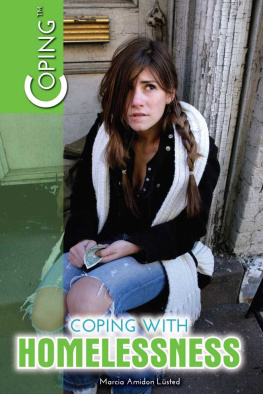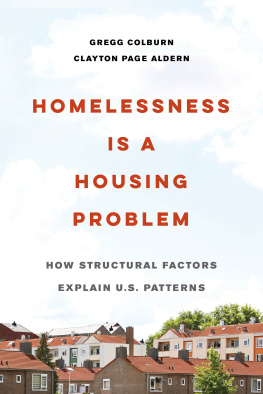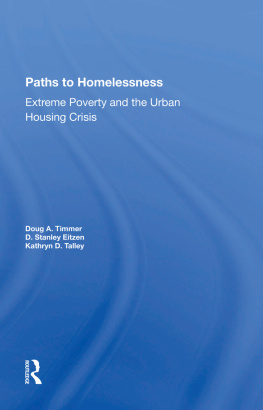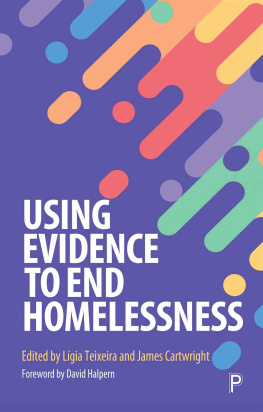PENGUIN CANADA
HOMELESSNESS
JACK LAYTON is the leader of the New Democratic Party of Canada and member of Parliament for the riding of Toronto Danforth. He served as a Toronto city councillor for 20 years, where he led the campaign to tackle homelessness. Layton served as president of the Federation of Canadian Municipalities from 2001 to 2002, and his work there led to the development of a coalition of municipalities from across Canada that works together for a renewed federal housing policy. At City Hall, he co-chaired the Advisory Committee on Homelessness and Socially Isolated Persons, which provides a vital policy link to front-line workers and people who have experienced homelessness. Layton has been a professor at all of Torontos universities, teaching in various fields, from political science to environmental studies. He lives in Toronto with his wife, Olivia Chow, who is the member of Parliament for the riding of Trinity Spadina, and with Olivias mother, Ho Sze Chow. They have two grown children, Sarah and Michael.

JACK LAYTON
with
Michael Shapcott

PENGUIN CANADA
Published by the Penguin Group
Penguin Group (Canada), 90 Eglinton Avenue East, Suite 700, Toronto, Ontario, Canada M4P
2Y3 (a division of Pearson Canada Inc.)
Penguin Group (USA) Inc., 375 Hudson Street, New York, New York 10014, U.S.A.
Penguin Books Ltd, 80 Strand, London WC2R 0RL, England
Penguin Ireland, 25 St Stephens Green, Dublin 2, Ireland (a division of Penguin Books Ltd)
Penguin Group (Australia), 250 Camberwell Road, Camberwell, Victoria 3124, Australia
(a division of Pearson Australia Group Pty Ltd)
Penguin Books India Pvt Ltd, 11 Community Centre, Panchsheel Park, New Delhi
110 017, India
Penguin Group (NZ), 67 Apollo Drive, Rosedale, North Shore 0632, New Zealand
(a division of Pearson New Zealand Ltd)
Penguin Books (South Africa) (Pty) Ltd, 24 Sturdee Avenue, Rosebank,
Johannesburg 2196, South Africa
Penguin Books Ltd, Registered Offices: 80 Strand, London WC2R 0RL, England
First published in Penguin Canada paperback by Penguin Group (Canada),
a division of Pearson Canada Inc., 2000
Published in this revised edition, 2008
1 2 3 4 5 6 7 8 9 10 (WEB)
Copyright Jack Layton, 2000, 2008
Foreword copyright Cathy Crowe, 2008
Author representation: Westwood Creative Artists
94 Harbord Street, Toronto, Ontario M5S 1G6
Table on page : Source: Canada Mortgage and Housing Corporation, 2001. All rights reserved. Used with the consent of CMHC. All other uses and reproductions of this material are expressly prohibited.
All rights reserved. Without limiting the rights under copyright reserved above, no part of this publication may be reproduced, stored in or introduced into a retrieval system, or transmitted in any form or by any means (electronic, mechanical, photocopying, recording or otherwise), without the prior written permission of both the copyright owner and the above publisher of this book.
Manufactured in Canada.
LIBRARY AND ARCHIVES CANADA CATALOGUING IN PUBLICATION
Layton, Jack, 1950
Homelessness : how to end the national crisis / Jack Layton ; with Michael Shapcott.
Rev. ed.
Previous ed. had subtitle : the making and unmaking of a crisis.
Includes bibliographical references and index.
ISBN 978-0-14-305524-2
1. HomelessnessCanada. 2. HousingCanada. 3. Housing PolicyCanada.
I. Shapcott, Michael II. Title
HV4509.L39 2008 363.50971 C2007-907684-X
ISBN-13: 978-0-14-305524-2
ISBN-10: 0-14-305524-0
Visit the Penguin Group (Canada) website at www.penguin.ca
Special and corporate bulk purchase rates available; please see www.penguin.ca/corporatesales or call 1-800-810-3104, ext. 477 or 474
To
Eugene Upper
The authors net royalties will be devoted to
efforts to achieve an affordable-housing program for Canada.
Contents
Foreword
I first made the connection between health and homelessness in the mid-1980s at the public inquiry into health and homelessness in Toronto. I remember squeezing into the standingroom-only meeting at a downtown community centre one Saturday morning and listening to the evidence presented by front-line workers and homeless people. Thats when I first met Jack Layton, who at the time was a downtown city councillor and chair of Torontos Board of Health and who sat on the inquiry panel. Inspired in part by this experience, I became a street nurse a year later.
Most Canadians know the Tommy Douglas story and how we got our national health care program, medicare. But many do not know the history of how we got our national housing program. Fuelled by the experience of the Depression years, the fight for a national housing program was won by ordinary Canadians, men and women who after the Second World War campaigned hard for affordable housing. The campaign took the form of rallies, demonstrations, pickets and even the occupation of government buildings. It led to a successful national housing program, with housing recognized as a basic right.
In the early 1990s, our national housing program was eliminated. How did we let this happen? If we had rallied to save the housing program, Canada would not be suffering from a homelessness crisis today. From the end of the Second World War until 1993, the national housing program built 650,000 units that continue to house 2 million Canadians. Since the program was cancelled, waiting lists for affordable housing have become backlogged with wait times of five to ten years in most of the big cities.
Despite clear evidence that housing is necessary for health and basic survival, the federal government withdrew from social housing. The provinces followed, downloading responsibility for housing to the cities, which have been largely unable to cope with the demand for affordable housing. This dismantling of our national program has been a key factor in the growing gap between rich and poor and the explosion of homelessness in our communities.
As Jack Layton and Michael Shapcott outline in such detail in this book, homelessness grew out of control in the mid-1990s, beginning with the 1993 federal budget, when all construction for new social housing was eliminated. The impact was felt from Vancouver to Saint Johns, in rural communities and in the North.
I first met Michael Shapcott in the 1980s when he was an outreach worker in downtown Toronto, at the Christian Resource Centre drop-in in Regent Park. I remember Michael and his dog Henrietta going to check on people who were living outside in very isolated conditions. Homeless people loved Henrietta, and they loved Michael too. Michaels vantage point was that of a community activist, but an activist with a mind for strategy, good research and the ability to utilize both legal and political means to move the policy agenda forward. This ranged from developing a community housing response to the Rupert Hotel fire that tragically killed 11 people, to developing legal strategies in the freezing deaths inquest, to co-founding numerous organizations, including the Toronto Disaster Relief Committee (TDRC), which declared homelessness a national disaster.
I had the particular vantage point of being a street nurse working at what can only be described as the epicentre of homelessness in Canadathe corner of Sherbourne and Dundas in downtown Toronto. It was from that vantage point that I began seeing things I couldnt at first explain, and problems I couldnt easily treat or prevent: the return of tuberculosis, malnutrition, the horrible effects of crowding in shelters (infections, theft, sleep deprivation, anger and depression), clusters of homeless deaths, even freezing deaths. In response, there were dedicated and creative acts of resistanceactivists and labour and faith groups insisted that empty armouries and hospitals be used for emergency shelter, outreach programs distributed survival supplies such as sleeping bags to the increasing number of people living outdoors, and there were organized squats like the Rooster Squat and Tent City.
Next page








